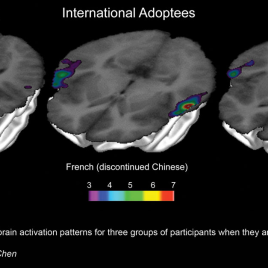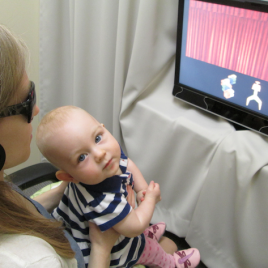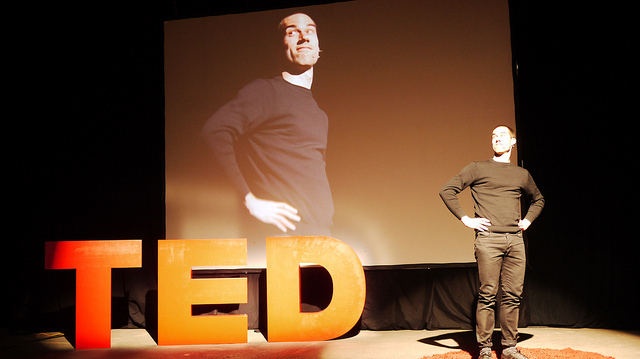How do you encourage women to remain active in science, technology, engineering and mathematics? One route seems to be in creating environments in which female students participate in small groups with high proportions of women, says a new study. In a U.S. study, 120 female undergraduate engineering students were assigned into four-person groups that varied […]
Tag: education
For sleeping children, quality is more important than quantity
For young children, the quality of sleep may be more important than the duration of sleep when it comes it academic performance, according to a new study. The researchers found that a high percentage of time in bed spent sleeping influenced positively a child’s grades in math, English, and French as a second language, while […]

Mapping unconcious memories of a lost language
A new study shows that our brains light up when we hear a language we once knew, even if we no longer understand it. The study used functional magnetic resonance imaging (fMRI) to study the brains of three groups of children: those who spoke only French, those who were bilingual in French and Chinese, and […]
Everything you want to know about climate change in three easy lessons
The Pacific Institute for Climate Solutions (PICS) recently released the third and final installment of Climate Insights 101, a free online course designed to help journalists and the public get up to speed on the best available peer-reviewed science about climate change. The new installment, BC Climate Impacts and Adaptation. Through videos and test-your-knowledge sections the […]
‘Meaningful’ mistakes help learning at any age
A new study suggests that trial-and-error learning benefits memory in both young and old people, but only when errors are meaningfully related to the right answer. The study tracked 65 younger (average age 22) and 65 older (average age 72) people who tried to memorize lists of words. Making wrong guesses when given a clue […]
Gamers can be quick learners
A new study suggests that while people who play video games don’t necessarily have better sensorimotor skills than non-gamers, they are significantly faster at learning sensorimotor tasks. A group of 18 gamers and 18 non-gamers were asked to complete a task that involved keeping a cursor in the centre of a moving target. When the […]

Roots of culture: How chimps learn from each other
It’s long been suspected that tool use in chimps is passed on socially, but a new study catches them in the act and puts a number on the impact. Researchers observing chimps in Uganda noticed that when one adult male discovered a new way of using leaves and moss to soak up water for drinking, […]
Helping grad students prepare for life beyond the lab
Graduate students in Ontario have a new tool to help them prepare for life beyond the lab. MyGradSkills.ca is a new website available to any Ontario graduate student via their university e-mail account. It offers 18 short, self-paced training units on topics such as how to write a resume, how to conduct a job search, the […]
Hand sanitizers in classrooms do not reduce school absences in children
Alcohol-based hand sanitizer dispensers in classrooms do not lead to reductions in the rate of school absences in children, a new study shows. The researchers conducted a randomized trial on 68 city primary schools (2443 children aged between 5-11 years old) in New Zealand. They found that the rate of absence was similar in the […]

Children tune into their parents, regardless of language
Monolingual children and bilingual children are equally good at learning new words, as long as they hear them from people who comes from their own language environment, a new study shows. Researchers tested thirty 17-month-old French-English bilinguals’ infants and thirty-one English monolinguals’ infants learning two simple pair of syllables (‘kem’ and ‘gem’) produced by an […]
Can the internet improve mental health for university students?
A randomized study on 1047 university students showed that online interventions can be effective at helping them cope with mental health disorders.University is a time when many students are at risk from common mental health disorders such as depression, anxiety, eating disorders and alcohol and drug abuse. The study showed that students at high […]

Does the medium affect the message?
The audience for a TED Talk depends on both the platform and the presenter, a new study shows. The researchers found out that those who watch the videos on YouTube were more likely to leave comments about the presenter, whereas those viewing on the TED website tended to engage with the talk content. They […]

Portrayals of animals in children’s books
A new study shows that children who read books where animals were described using anthropomorphic language (e.g. talking, arguing) or images (e.g. wearing clothes) were more likely to attribute anthropomorphic characteristics to real non-human animals that those who heard a story with realistic language or images. The authors say that such books impact children’s […]

Spotlight Report on Science Learning | Webinar recording
Canadian students excel at science – so why are so few choosing to pursue it? And just how big a problem will that be in tomorrow’s job market? The report “Spotlight on Science Learning”, commissioned by Amgen Canada and Let’s Talk Science, tackles why Canadian students opt out of science, engineering, technology and math (STEM) […]
